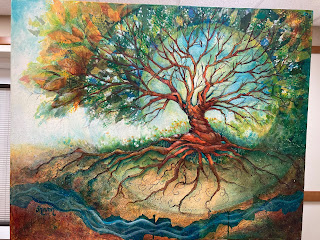It’s the morning after Christmas. We’re at our daughter’s house and so far I’m the only one up. Outside the day is slowly dawning. It looks like clear skies today. Tomorrow we’ll head back home.
As a child, I remember being sad
on the day after Christmas, thinking I would have to wait a whole long year for
this magical time to come around again. Now that I’m on the far end of the age
spectrum, I don’t feel that way. “Normal” life sounds good.
For children, and even for us
adults if we’re honest, Christmas focuses on the presents around the tree. As a
kid I would surreptitiously stalk out the packages, find the ones with my name
attached, and try to guess what treasure might be inside. The heavier the
package, the more promising the treasure.
As parents, and now grandparents, choosing
the gifts and watching the kids open them on Christmas morning is more fun that
getting the stuff ourselves. I admit to more than occasional qualms about
materialism, thinking about kids around the world who would be overwhelmed with
our abundance. But I somehow manage to stifle my qualms as we gather around the
tree for the ceremonial distribution of the gifts.
I always love being at our
daughter’s home. We’ve been part of the lives of our three grandchildren since
they were infants and now they are all young adults. That makes for an entirely
different Christmas dynamic. In addition to the pleasure of receiving and
opening presents, they’ve all become generous givers, and that’s even more fun
to witness.
I was a bit overwhelmed myself when we arrived last week and saw the mound of presents around the tree. I guess that’s natural when you have a family of five generous, creative, and loving people. But I did think that maybe they had outdone it this year. “Just relax, Mom,” Kristin told me, “and enjoy it.” Wise advice.
I was concerned, though, about the modesty of our own offerings. We’re in a different stage of life where most of our income goes into the retirement community fees (well worth it, I might add). Much of our creativity these days focuses on finding ways to live frugally, which is not a bad thing. That frugality affects the extravagance—or lack of it—of our giving. But, of course, it does not affect the extravagance of our loving. Or of our creativity.
I had found some bargains in the retirement
community’s resale store, some vintage items I would have paid a lot for
elsewhere. And I went through our store of precious stuff we need to pass on to
the next generation and picked out some items for this season. And I also did
some shopping down town. Nothing extravagant.
I need not have worried. As we sat around the living room on Christmas morning, read the Christmas story once again, and sang carols, we refocused on the greatest Gift of Christmas, the baby born to be King. We prayed together for the people of Gaza, Israel, Russia, and Ukraine. We asked that “Peace on earth, good will to all people” become a reality. And we took our time doing all this. A few tears were shed.
And then the opening of the gifts. Kristin’s family has a unique way of carrying out this ritual, with the intention of making the experience last as long as possible. We each had a large stocking and went around the circle, taking turns removing one item at a time. A bar of sweet-smelling soap, the inevitable Life Savers, a scarf, fuzzy socks, a practical box of hand-wipes, a candy cane, all accompanied by exclamations or, when appropriate, groans (the hand-wipes).
Then we went to
the table for a traditional Christmas breakfast of coffee-cake and orange
juice. Kristin imported the coffee-cake ritual from her growing-up years in our
home. Similar recipe.
And then it was back to the living room for the opening of the presents, another event that proceeded slowly and in an orderly (but simultaneously chaotic) manner. The atmosphere was fun and very affectionate, with people more concerned about how the gifts they gave were received, which was usually with delight. Peter, the youngest among us at 14, chose and distributed the gifts, one at a time of course, so that everyone could concentrate on the one opening his/her present.
It was a hilarious and holy time, with lots of exclamations (“Oh Grandma! I love this!”), laughter, and affection. Hal and I were amazed at Kristin’s gift to us, a large sherpa blanket covered with photographs of us and the grandkids. I treasure it. (Each kid also got their own photographic blanket.)
So now it’s the
day after Christmas. I’m hoping for some time playing games with the kids,
talking with our daughter and son-in-law, maybe watching a movie together,
eating of course, but everything low-key. Normal life (whatever that is). It’s
been good.
I still struggle
with juggling all this abundance and joy with what is happening in other parts
of the world. I still need to be intentional in my focus on the Gift of Christ.
I still need all the help I can get in living my life (my normal life) in light
of the Gift which is for the whole world.
Let there be peace on earth, dear Lord. Show me how to be a part of what you are doing.





























.jpg)





.jpg)



.jpg)